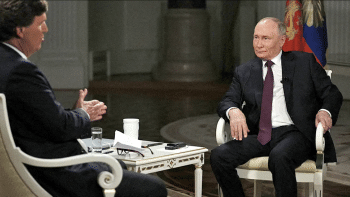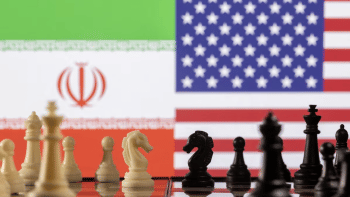A dangerous moment for US hegemony

On January 31, Thomas Friedman, ambassador-at-large of the US' imperial power, delivered a new pitch from his perch at The New York Times, bravely acknowledging "the seriousness and complexity of this dangerous moment" for "American hegemony."
What is this "dangerous moment"? Is it the discovery by the CIA of a Chinese plan to lay siege to Taiwan, or Russian forces advancing on the capital of Ukraine, or thousands of Iranian attack boats blockading the Straits of Hormuz? It's none of these.
Instead, this "dangerous moment" is the result of actions emanating from a tiny sliver of land no larger than the smaller cities in the United States, whose impoverished population of 2.3 million Palestinians have lived in an "open-air prison" since 2007, regularly subjected to carpet bombing by Israel—the US' unsinkable aircraft carrier in the Middle East. It is this tiny enclave, Gaza, that has Thomas Friedman running scared.
What is it about the human spirit (note to self: Palestinians are human, not "human animals") that compels a weak, ethnically cleansed, terrorised people to resist the might and power of the world's most powerful nation? Friedman admits obliquely that it is an act of resistance by Gazans that now disturbs the US, Israel, and their Western accomplices.
Until the morning of October 7, 2023, the US, Israel, and their Arab protectorates were blithely convinced that the "juggernaut" of the so-called Abraham Accords would bury the Palestinians forever.
Yet, after nearly four months of the most destructive bombing in recent history, the esteemed NYT columnist is forced to acknowledge that October 7, 2023 "is forcing a fundamental rethinking about the Middle East within the Biden administration." Is the human spirit still capable of such miracles?
A "rethinking" is underway in the highest councils of the US establishment, Friedman somberly warns the Iranians of an awareness growing "that we can no longer allow Iran to try to drive us out of the region, Israel into extinction and our Arab allies into intimidation by acting through proxies." The added italics are perhaps unnecessary. A question arises: why has the US allowed Iran to challenge its power?
The inestimable Thomas Friedman uncharacteristically makes a dangerous confession. Once again, he writes, there is an awareness "that the US will never have the global legitimacy, the NATO allies and the Arab and Muslim allies it needs to take on Iran in a more aggressive manner unless we stop letting Israeli Prime Minister Benjamin Netanyahu hold our policy hostage..." Did The New York Times really allow these words to slip onto its op-ed pages? Did Friedman just acknowledge that the United States allows an Israeli prime minister to "hold our policy hostage"? Isn't this a libel against Israel? Isn't this pure anti-Semitism, pure evil?
However, cleverly as always, Friedman is blaming only one bad Israeli apple, only one Israeli prime minister for holding US policy hostage. In reality, Israel has been holding the US' Middle East policy hostage ever since the six-day war in 1967. This is what all Israeli governments have done over many decades.
If the US has been letting Israel subvert its policies for decades, what has changed since October 7, 2023 that will allow it now to stand up to Israel's bullying? Far from standing up to Israel, Joe Biden and Anthony Blinken have been spending even more time genuflecting before Israeli leaders.
Why, then, did Friedman take the trouble to outline what he claims is the new Biden Doctrine purportedly taking shape in Washington?
Arguably, that is because Friedman likes his job as ambassador-at-large of US imperial power, and he is clever with words, too clever by half. With help from an Iranian native informant—Nader Mousavizadeh, a former executive at the World Economic Forum—Friedman concocts a Biden Doctrine that he thinks will save the US hegemony for a thousand years.
So, what does Friedman's Biden Doctrine require Joe to do? The US President must mount a "robust military retaliation against Iran's proxies." He must come up with "some form [yes, some form] of US recognition of a demilitarised Palestinian state in the West Bank and Gaza." This will happen only after Palestinians convince Israel that their state "would never threaten Israel." Thirdly, Joe must give Saudi Arabia the security guarantees it is demanding as quid pro quo for normalising its relations with Israel.
If this reads like a sophomoric fantasy, that is because it is.
Friedman assumes that October 7, 2023 never happened; that today's Middle East hasn't changed since June 1967; that the two-state solution is not dead, despite the 720,000 Jewish colonies and 256 settler-colonies in the West Bank and East Jerusalem; and that the politics that drove the US' Middle East policy for five decades will magically disappear as soon as the US announces this Biden Doctrine. Yet, these are not the only fantasies that underlie the Biden Doctrine.
The Doctrine also assumes that US' "robust military retaliation" will destroy Hezbollah, the Houthis, and multiple resistance groups in Syria and Iraq; that Israel will destroy Hamas and pacify the West Bank; that the vigorous actions of Don Quixote and Sancho Panza will return the Middle East to where it was after the collapse of the Soviet Union.
Israel could bully the United States on nearly all fronts, but there is a red line the latter has refused to cross. The US has persistently resisted Israeli pressures to start a war against Iran or join it in attacking Iran's nuclear assets.
Over more than three decades, the US military has vetoed US neoconservatives demanding war against Iran. US bombs did not descend on Iran after the Ayatollah removed the Shah, or after the fall of the Soviet Union. After the 9/11 attacks, under pressure from neocons, the US attacked Iraq, not Iran.
Will the US attack Iran now when it has grown its economy, technology, military, and proxies to become the leading power in the Middle East, barring the United States? Will the US military risk savaging its reputation again after its disastrous wars in Afghanistan and Iraq? Can the US simultaneously wage a war in the Middle East and the South China Sea?
Is it too much to expect Friedman to get real and do a dozen interviews to understand what October 7 actually says about all the ways in which the Middle East has changed since Operation Shock and Awe?
Let Friedman ask what is it that has enabled Gazans and the Houthis to make the world turn on a time; what is it that is exposing Israel's narrative of victimhood, for the farce that it is; and why people across the world have been mounting daily protests against Israel's genocide of Palestinians.
Let him also ask why the United States is so openly, brazenly funding and arming the perpetrator of a genocide, when it should be working very hard to play down its history of war-mongering against the Global South. Can a US that bombs compete with a China that builds?
What is the lunacy that leads Western leaders, at a single cue from Israel, to collectively defund UNRWA and, thereby, worsen the famine-like conditions forced upon the Gazans by Israel's genocidal war? Are Europe's leaders trying to neutralise the Gazans before they begin showing up on Europe's shores, once Israel drives them out of Gaza?
Since Thomas Loren Friedman has now dared to stand up to Israel, let him also summon the moral courage of Aimé Césaire, a Martinican poet and revolutionary, to remind Western leaders that "a civilisation that uses its principles for trickery and deceit is a dying civilisation."
But that would be asking a leopard to change its spots. Is there a chance that this might happen? We have witnessed a few miracles lately. Will Thomas Friedman surprise us with another minor miracle?
M Shahid Alam is a retired professor of economics at Northeastern University. He is the author of 'Israeli Exceptionalism' and 'Intimations of Ghalib'. He can be reached at [email protected]
Views expressed in this article are the author's own.
We welcome your contributions and analysis of global events. To submit articles to our weekly page, Geopolitical Insights, please send an email to [email protected]
Follow The Daily Star Opinion on Facebook for the latest opinions, commentaries and analyses by experts and professionals. To contribute your article or letter to The Daily Star Opinion, see our guidelines for submission.

 For all latest news, follow The Daily Star's Google News channel.
For all latest news, follow The Daily Star's Google News channel. 














Comments